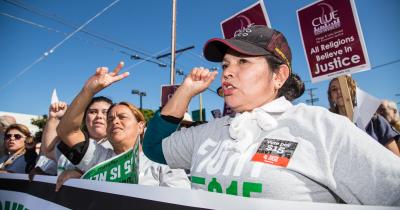
This Labor Day: Four Policy Ideas for a More Inclusive Labor Movement
Labor Day should be more than a pause to honor the past. Our democracy and our economic security—today and tomorrow—is tied to the vibrancy of the labor movement.

This post was originally emailed to Demos subscribers as the September President's Letter. Join our list to get future President's letters sent to your inbox every month.
On this Labor Day, we celebrate workers and recognize the accomplishments of the U.S. labor movement.
Over a century ago in the First Gilded Age, it was the rise of organized labor that forced powerful new mega-corporations and the concentrated wealth and political power at the top to reckon with ideals of equality and democracy—helping pave the way for the wages, labor rights, worker protections, and social safety net that provided a measure of stability and freedom for so many communities.
Until recently, these advances largely excluded women and communities of color. Yet even as contemporary campaigns like Fight for $15 champion the women and people of color who dominate the lowest-paid jobs, extreme corporate practices and public policies continue to distort our economy into an engine that efficiently produces exclusion, inequality and insecurity.
We at Demos are thinking today of those workers who don’t get this holiday weekend off, those whose previous generations have been barred from the protections and supports of the social contract, and those whose activism and organizing today is finally bringing this country closer to its ideals.
The vision and power of working families has shown us throughout our history that the ills of our economy don’t just happen; they are created by actors who benefit from the inequality. But history has also demonstrated that “we the people” have the tools to change our economy, through the power of organized workers, united in an inclusive labor movement.
Here are ideas of where to start:
Be clear on who is working class
Too often commentators and politicians talk about the “working class” by evoking a narrow, outmoded archetype: a white man laboring in a factory. But today’s working class is much more complex and diverse.
Establish a public credit registry
Job seekers can be denied work based on credit histories which are themselves the product of a system steeped in decades of structural racism. Here's a practical solution.
Pass state-level policy agendas that improve our economy and our democracy
With national politics tangled in scandal and stalemate, we put forward 26 race-forward, populist policies states can advance now.
Demand a 2020 federal economic agenda that uplifts all working people
Here's an achievable federal agenda that advances equity, inclusion, and economic opportunity for all working people.
Labor Day should be more than a pause to honor the past. Our democracy and our economic security—today and tomorrow—is tied to the vibrancy of the labor movement. Let’s take a moment to recognize our labor history and rededicate ourselves to a more just future for all workers.
Case study: Marriott Hotels
A key challenge workers face is the constant drain of often-hidden practices that extract money from their pockets—and the lack of bargaining power to challenge those practices.
Last year, Demos was proud to bring our research to support the largest hotel strike in U.S. history, partnering with Marriott workers to push back on predatory lending practices that the company imposed on its own predominantly Black and Latino workforce.





